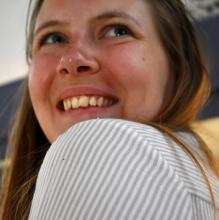Jayden Lloyd
Why did you decide to pursue a graduate degree?
In the second year of my MA, while I was deciding whether or not I wanted to pursue a PhD, a mentor gave me the best advice that I've gotten about grad school: "Don't do it because you want a job in academia; do it because you're excited about the research." I love archaeology, history, and the big questions that we're constantly asking in this field. I believe that whether or not I stay in academia after my PhD, this degree will have given me a great opportunity to develop as a scholar, teacher, and person.
Why did you decide to study at UBC?
I always half-joke that I came to UBC for the mountains, but it's a little true! I completed my undergrad here, and I love being so close to the mountains and ocean. Vancouver really feels like home. The other big reason was the department that I'm in (see next question)!
What is it specifically, that your program offers, that attracted you?
The Classical, Near Eastern and Religious Studies Department at UBC is, as the name sounds, very interdisciplinary. Because we cover everything from Mesopotamian legal structures, to Greek tragedy, to Early Christianity, we are constantly, in our classes and in the lunch room, finding ways to make connections between fields and challenged to make our research accessible to non-specialists.
What was the best surprise about UBC or life in Vancouver?
Green College! Green College is a residence on campus made up of graduate students, post docs and visiting professors. At Green College I made connections with students in fields that span UBC's graduate offerings, and the conversations I have had over dinner there have been some of my best UBC memories thus far.
What aspects of your life or career before now have best prepared you for your UBC graduate program?
As a first-generation university student, there were a lot of things in my educational experience that I had to figure out. Post-secondary education is complex and often confusing, and tackling it on my own was often stressful, but I think that it also meant that I took great ownership of my education. With this perspective, I also hope that through my work, I can make post-secondary seem less opaque for others. While I made it through, there are too many students who don't, and I firmly believe that in order for education to be inclusive and accessible, we need more first-gen. students in higher ed.
What advice do you have for new graduate students?
People love to give advice, but ultimately the person that knows what's best for you, is you.
